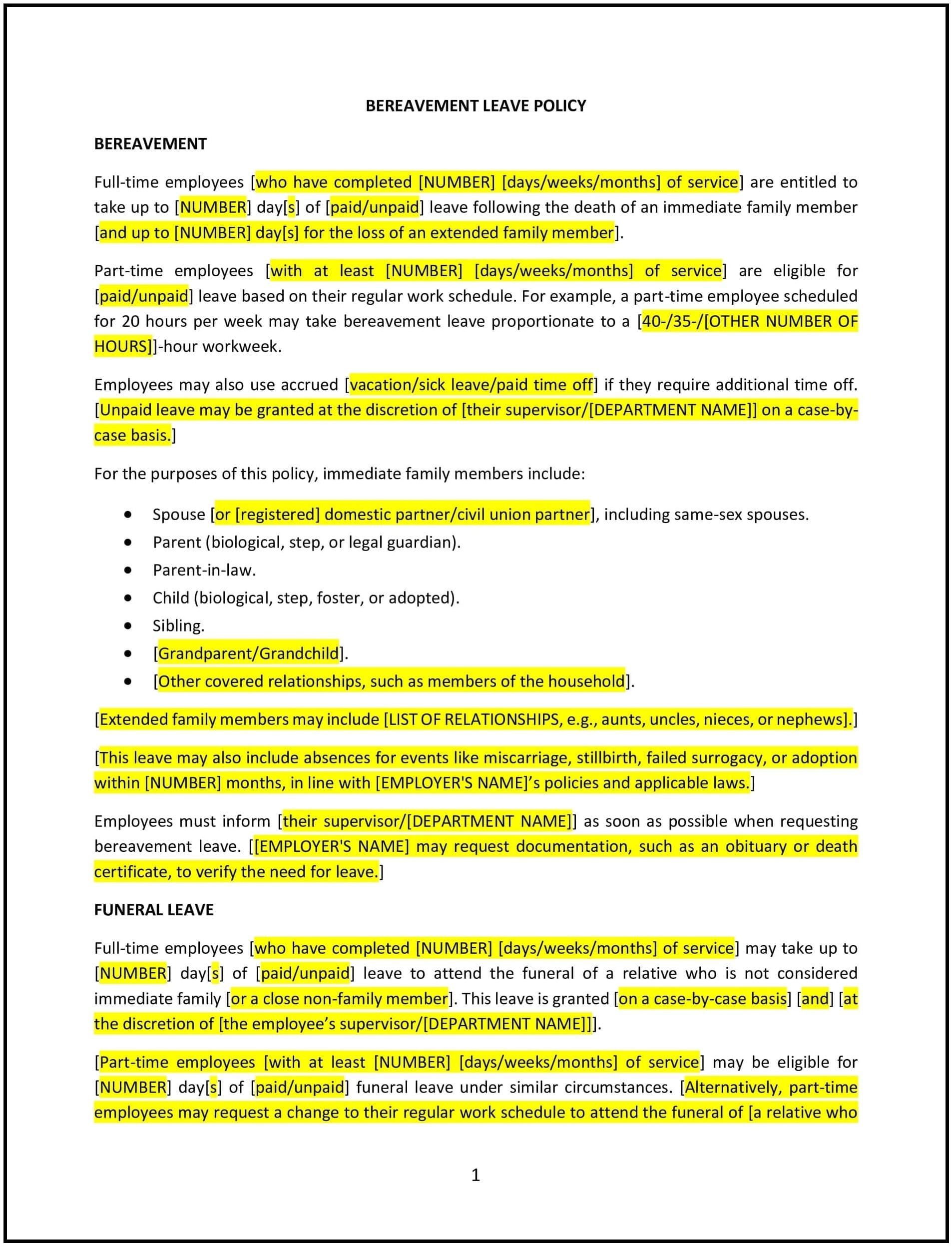Bereavement leave (New Jersey) policy: Free template
Got contracts to review? While you're here for policies, let Cobrief make contract review effortless—start your free review now.

Customize this template for free
Bereavement leave (New Jersey)
A bereavement leave policy helps New Jersey businesses provide employees with time off to grieve and manage arrangements after the loss of a loved one. This policy outlines eligibility, the duration of leave, and the process for requesting time off. It also sets expectations for communication between employees and employers during a difficult period.
By adopting this policy, businesses in New Jersey can support employees in times of loss while maintaining operational stability.
How to use this bereavement leave policy (New Jersey)
- Define bereavement leave eligibility: Specify which employees qualify for bereavement leave, including full-time, part-time, and temporary employees. Clarify whether leave applies to immediate family members, extended relatives, or other significant relationships.
- Set leave duration: Outline how many days of leave are provided, whether it varies by the relation to the deceased, and whether additional unpaid leave may be granted upon request.
- Establish the request process: Explain how employees should notify their employer of a bereavement leave request, including required notice and any documentation, such as an obituary or funeral program.
- Address paid and unpaid leave: Clarify whether bereavement leave is paid or unpaid and if employees may use accrued paid time off (PTO) or other leave benefits for additional time.
- Outline return-to-work expectations: Provide guidance on returning to work, including flexible arrangements for employees who need additional time to grieve or manage affairs.
- Offer additional support: Encourage employees to access available resources, such as employee assistance programs (EAPs) or counseling services, to help cope with grief.
- Review and update: Regularly assess the policy to reflect changes in New Jersey workplace laws and business needs.
Benefits of using this bereavement leave policy (New Jersey)
This policy provides several benefits for New Jersey businesses:
- Supports employees during a difficult time: Provides employees with the time they need to grieve without added workplace stress.
- Promotes a compassionate workplace culture: Demonstrates that the business values employee well-being and work-life balance.
- Enhances employee loyalty and morale: Encouraging empathy and flexibility fosters stronger employee retention and engagement.
- Maintains operational stability: A structured policy allows businesses to plan for temporary absences while ensuring workflow continuity.
- Reduces uncertainty: Clear guidelines help employees and managers navigate bereavement leave requests with consistency and sensitivity.
Tips for using this bereavement leave policy (New Jersey)
- Communicate the policy clearly: Ensure employees understand their rights and responsibilities regarding bereavement leave by including the policy in employee handbooks and onboarding materials.
- Allow flexibility where possible: Consider offering additional unpaid leave or remote work options for employees who need extended time to manage personal matters.
- Train managers on handling bereavement leave requests: Encourage supervisors to approach requests with empathy and discretion, ensuring a respectful and supportive work environment.
- Offer additional resources: Provide employees with access to grief support services, such as EAPs or counseling, to assist with emotional and mental well-being.
- Review the policy periodically: Update the policy as needed to align with evolving workplace needs and best practices in bereavement support.